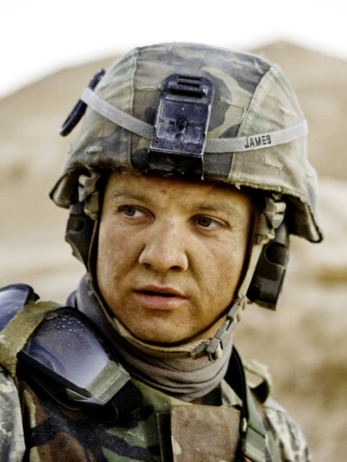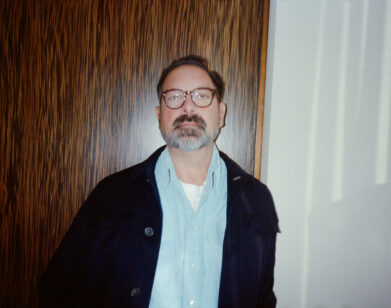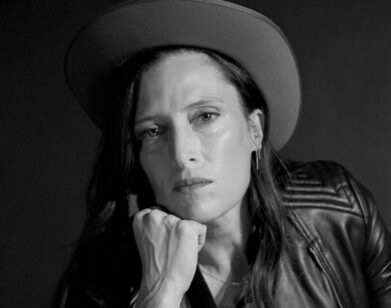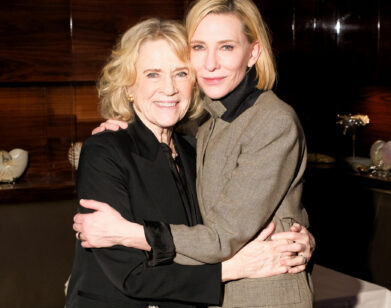Jeremy Renner Feels the Hurt

The Hurt Locker is doing its best to defy the curse of the Iraq War Movie. It does not feature bloviating aged liberals (Lions for Lambs), pretentious narrative conceits (Redacted) or Ryan Phillippe (Stop Loss). What it does have is a no-bullshit veteran action movie director in Kathryn Bigelow and a brilliant lead performance by the formerly underappreciated character actor Jeremy Renner. It’s currently tearing up art houses, and has been slowly making its way into an expanded number of theaters since opening in limited release in June. The film follows a three-man Army bomb disposal unit as it travels around Iraq defusing improvised explosive devices and dealing with alternately curious and hostile locals. As the leader of the team, Renner carries a surgeon’s tactical brilliance with a Top Gun swagger—it turns out his ego is writing checks that his body can cash. Perhaps best known for playing Jeffrey Dahmer in the lurid Blockbuster favorite Dahmer, Renner’s big leading man credentials are obvious from his first moment onscreen in The Hurt Locker. Renner is already thinking big about the future—as you’ll see below, he really wouldn’t mind playing Kurt Cobain sometime soon.
ANDREW MARTIN: I really enjoyed the movie.
JEREMY RENNER: Better than a stick in the eye, right? [LAUGHS]
AM: Slightly better, yeah. How has the positive reception to the movie affected you? Have you been getting offers and getting recognized on the street?
JR: Yeah, it’s at a much bigger level than I ever experienced. And I feel pretty blessed and lucky. I’m proud to be recognized for something like this rather than doing The Green Lantern or something … I mean nothing against that, that’d be fantastic, but its actually very much what I wanted to do so I feel blessed for that.
AM: I’ve heard the heat on the set in Jordan was absolutely overwhelming. Was it hard to focus on acting in those conditions?
JR: I think the focus first of all was really on not passing out. And that heat was difficult for everyone. The only thing really you could focus on was how to react to circumstances in the situation we were in. I mean, all the prep work in the year I was on it prior to shooting-that was all the work we did. Then it was just going out there and applying it. So yeah its tough for everybody, tough conditions working as an actor in the heat–makes you frustrated.
AM: How did you manage to relax on set?
JR: There was no relaxing on set. There were long fifteen hour days, then you go to the hotel, try to decompress, bottle of wine, eat a little bit of food… Talk about the day, what a pain in the ass it was. It was like Groundhog Day all over again.
AM: Is the movie as stressful to watch for you as it is for the rest of us?
JR: You know I’ve only seen it three or four times at this point and I don’t really watch it… it’s tough for me to watch. Personally, it reflects back on good and very terrible milestones in my life. So it’s tough to watch in a different way.
AM: Was it hard to adjust to being in Jordan? Was it hard adjusting to any cultural differences?
JR: Yeah, you know, I’m a California kid. I’m well-traveled, but I’d never been to the Middle East before. So I was a little nervous, a little hesitant. But I know it’s a very safe place-I mean if you’re gonna be in the Middle East that’s where you want to be. That’s where all the Iraqi refugees went to avoid the conflict, and that’s where there’s Palestinian refugee camps. Don’t get me wrong, we were still in the Middle East—our hotel was surrounded by guards with rifles, and metal detectors to get in. So I had mixed feelings about it. It was like, ok we’re safe, but why do we have to have all these things? Is there a threat?
AM: What were your interactions with the locals like?
JR: The people couldn’t have been more giving. They were very open and loving, so helpful and friendly. So it was really a great experience. And Amman, Jordan is a beautiful beautiful place. And you’ve got the Red Sea, and the Dead Sea, and Petra, you know, one of the 8 wonders of the world. We just weren’t shooting in those places!
AM: The Hurt Locker has been cited by some critics as the first non-political Iraq war movie. I wonder if you think there are any political implications to the movie or if you had any thoughts about the politics of the Iraq war.
JR: Well, my only thought is politics and cinema, they don’t match, they don’t go together. I think cinema should provoke thoughts, sure, but using it as I soapbox I think is the wrong place. I never want to be part of something like that, where there’s an agenda there that’s not about telling a story, where its someone getting on a soapbox and preaching their own beliefs onto somebody. Personally I like cinema like The Hurt Locker, because it doesn’t tell you what to feel or what to think. But it does tell you to think and to feel.
AM: You have singing credits in a few of your movies (The Assasination of Jesse James, North Country)–do you have a musical background?
JR: Yeah, yeah. Actually I do. I started as a young man, as a drummer, then moved to guitar, and piano so I could song-write. I was always a singer. But I was always focused on being an actor as my trade. Music I do just for me. The movie business is very difficult but the music business is just impossible. So I’ll play in bands and record and play songs with other people, but for me it’s a form of expression that all I need is me. I don’t need cameras or agents, I can just have a piano and sing and feel totally verified.
AM: It’s good that you get to good use sometimes.
JR: Yeah, I’m actually looking to do a project where I could really try to explore that a little bit more in cinema, a rock star or something. I’d really, really love to do that.
AM: I was wondering if there was any musician from the past or recent history that you’d most want to play.
JR: Yeah, I think they’re gonna do a movie about Kurt Cobain. So that could be interesting. That would be a real challenge. It would be a lot of fun to explore that. I don’t know what else is out there, but that’s one that’s sort of banging around in Hollywood. So I’d give that a go.
AM: You play a lot of tough guys—in SWAT and 28 Weeks Later and The Hurt Locker, to name a few. Is that a reflection of your personality or just a fluke of casting.
JR: I don’t know man, I don’t feel like a tough guy by any means. You know I also played a lot of bad guys… Dahmer… a lot of bad guys. And I think there’s a part of me in those characters, sometimes more than in others. In the Hurt Locker there’s a lot of me in there, a sense of humor, a man of few words and a lot of action. But then a movie like Dahmer… there’s very, very little of me in Jeffrey Dahmer. So I think it’s all about how people see you.
AM: What was it like being Jeffrey Dahmer? Was it hard to get into his head?
Well you know it happened so fast…it was the complete opposite of the Hurt Locker where I had time to prepare. I mean, I didn’t even know who Jeffrey Dahmer was, and then four days later after reading the script we’re shooting principal photography, and two weeks later we’re done. It was such a whirlwind…. I mean to relate to that experience, I had to do a lot of work and allow myself to go places that were a little scary. You know when you play a guy like that it allows you the freedom to explore really weird parts about you. And it’s ok. In order to really get it, I’ve got to allow myself to go there.






